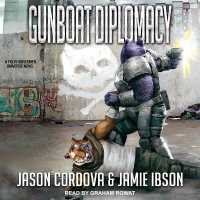- ホーム
- > 洋書
- > 英文書
- > History / World
Full Description
Archaeological interpretation is an imaginative act. Stratigraphy and artefacts do not tell us what the past was like; that is the task of the archaeologist. The diverse group of contributors to this volume address the relationship between archaeology and imagination through the medium of historical fiction and fictive techniques, both as consumers and as producers. The fictionalisation of archaeological research is often used to disseminate the results of scholarly or commercial archaeology projects for wider public outreach. Here, instead, the authors focus on the question of what benefits fiction and fictive techniques, as inspiration and method, can bring to the practice of archaeology itself.
The contributors, a mix of archaeologists, novelists and other artists, advance a variety of theoretical arguments and examples to advance the case for the value of a reflexive engagement between archaeology and fiction. Themes include the similarities and differences in the motives and methods of archaeologists and novelists, translation, empathy, and the need to humanise the past and diversify archaeological narratives. The authors are sensitive to the epistemological and ethical issues surrounding the influence of fiction on researchers and the incorporation of fictive techniques in their work. Sometimes dismissed as distracting just-so stories, or even as dangerously relativistic narratives, the use of fictive techniques has a long history in archaeological research and examples from the scholarly literature on many varied periods and regions are considered.
The volume sets out to bring together examples of these disparate applications and to focus attention on the need for explicit recognition of the problems and possibilities of such approaches, and on the value of further research about them.
Contents
1. Historical fiction and archaeological interpretation: introduction
Daniël van Helden and Robert Witcher
2. The cornflakes of prehistory: fact, fiction and imagination in archaeology
Caroline Wickham-Jones
3. Voices from the silence
Margaret Elphinstone
4. Beyond archaeological narrative: imagined worlds of Neolithic Europe
Mark Patton
5. Imagined realities in academic and fictional accounts of the British Mesolithic
Donald Henson
6. Walking in someone else's shoes: archaeology, empathy and fiction
Daniël van Helden and Robert Witcher
7. The multiverse of fiction: exploring interpretation through community archaeology
Francesco Ripanti and Giulia Osti
8. Entering undocumented pasts through playwriting
James G. Gibb
9. Encountering the past through slag and storytelling
Michael Given
10. Writing wonders: poetry as archaeological method?
Erin Kavanagh
11. Ambiguity and omission: creative mediation of the unknowable past
Giacomo Savani and Victoria Thompson
12. Spartacus: Blood and Sand (STARZ, 2010): a necessary fiction?
Fiona Hobden
13. Archaeology, historical fiction and Classical Reception Studies
Joanna Paul
14. Imagining the past through Film and Cultural Studies
Andrew B.R. Elliott
15. Archaeological narrative and humour in a post-truth world: the obligatory sum-up article
Adrian Praetzellis






